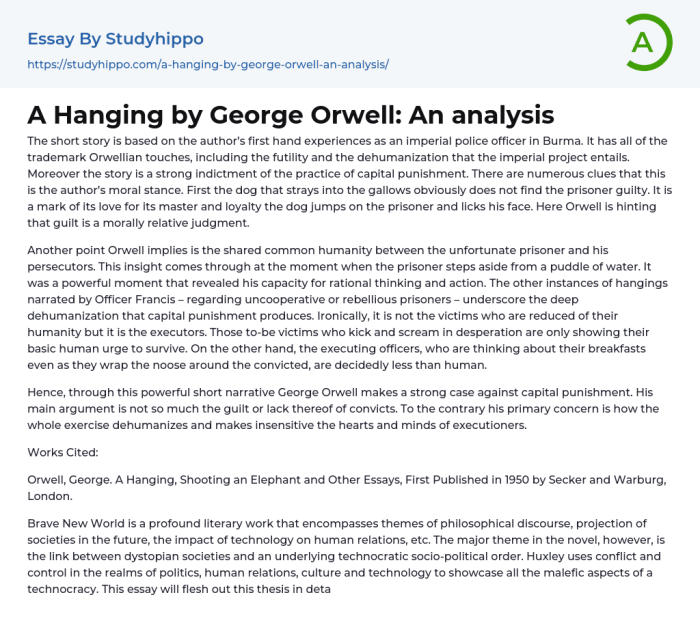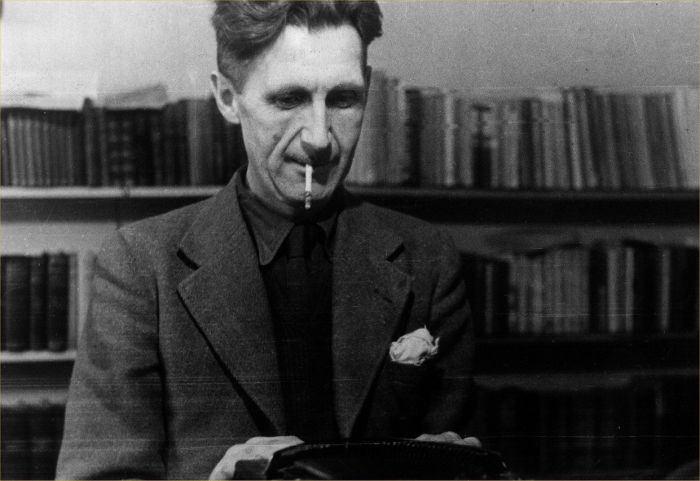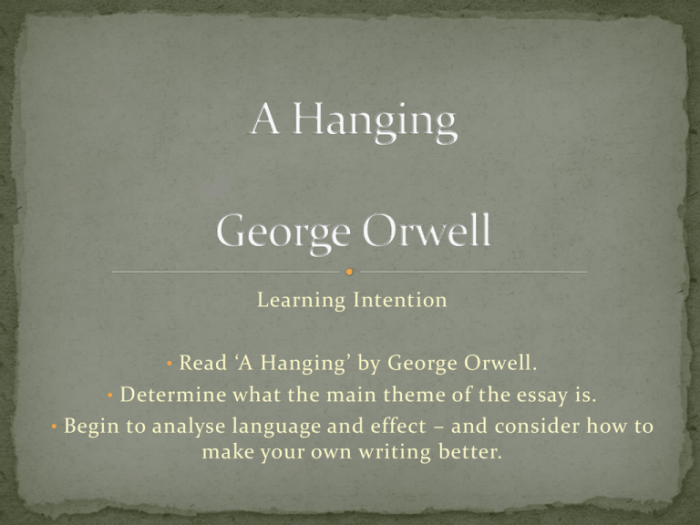A hanging george orwell essay – In George Orwell’s chilling essay, “A Hanging,” readers are confronted with a stark portrayal of societal control and oppression. Orwell’s evocative prose and incisive analysis paint a haunting picture of the dangers inherent in censorship, propaganda, and surveillance, leaving an enduring legacy that continues to resonate in contemporary discourse.
Orwell’s essay, first published in 1931, delves into the historical and social context of its time, exploring the political and ideological climate that shaped its Entstehung. Drawing upon his own experiences, Orwell crafts a powerful argument against the insidious forces that threaten individual freedom and the pursuit of truth.
Introduction

George Orwell, an acclaimed novelist and essayist, is renowned for his profound insights into the complexities of modern society. His essay, “Hanging,” published in 1931, is a poignant exploration of capital punishment and its impact on both the condemned and the society that sanctions it.
Upon its initial release, “Hanging” generated significant controversy, with critics vehemently opposed to Orwell’s unflinching portrayal of the execution process. However, the essay’s unflinching honesty and profound reflections on human nature have cemented its place as a powerful and enduring work of literature.
Main Themes
“Hanging” delves into a multitude of themes, including the inherent cruelty of capital punishment, the dehumanizing effects of violence, and the complex interplay between justice and morality.
Orwell’s vivid depiction of the hanging process exposes the brutality and indignity of state-sanctioned killing. He argues that capital punishment is not only a violation of human rights but also a barbaric practice that perpetuates violence and diminishes the value of human life.
Furthermore, Orwell explores the psychological toll that executions take on both the condemned and the executioners. He reveals the dehumanizing effects of violence, showing how it corrupts and brutalizes all involved.
Ultimately, “Hanging” challenges readers to confront the fundamental questions of justice and morality. Orwell argues that society must find more humane and effective ways to deal with crime and that the death penalty is a morally repugnant and ineffective solution.
Context and Background

George Orwell’s essay “Hanging” was written in 1931 amidst a tumultuous period in history. The Great Depression had plunged the world into economic turmoil, leading to widespread unemployment and poverty. Political extremism was on the rise, with the rise of fascism in Europe and the growing threat of war.
Political and Ideological Climate
Orwell’s essay was heavily influenced by the political and ideological climate of the time. The essay reflects Orwell’s disillusionment with the British Empire and its colonial policies. He witnessed firsthand the brutality of British imperialism during his time in Burma, and this experience left a lasting impact on his writing.
Personal Experiences and Motivations
Orwell’s personal experiences also played a significant role in shaping the essay. He had served as a police officer in Burma, where he witnessed the execution of a Burmese man. This event deeply affected Orwell, and he later wrote about it in “Hanging.”
The essay is a powerful indictment of capital punishment and a reflection on the nature of violence and the human condition.
Analysis of Key Themes

Orwell’s concept of “hanging” serves as a powerful metaphor for the oppressive control exerted by society. He argues that individuals are subjected to a constant threat of punishment or ostracism, which effectively stifles their thoughts and actions.
Censorship
Orwell highlights the insidious role of censorship in silencing dissenting voices. He provides examples of books being banned, newspapers being suppressed, and individuals being imprisoned for expressing their opinions. Through these tactics, society ensures that only the approved narrative is disseminated, while alternative perspectives are marginalized.
Propaganda
Propaganda is another tool used to manipulate public opinion and maintain societal control. Orwell demonstrates how governments and other powerful entities use propaganda to spread misinformation, distort facts, and create a favorable image of themselves. By bombarding individuals with biased information, propaganda aims to shape their perceptions and mold their beliefs.
Surveillance
Surveillance is a pervasive aspect of Orwell’s dystopian society. He depicts a world where individuals are constantly monitored, their movements tracked, and their communications intercepted. This constant surveillance creates an atmosphere of fear and paranoia, discouraging individuals from engaging in any form of dissent.
Implications for Contemporary Society
Orwell’s warnings about societal control and oppression remain relevant in contemporary society. While censorship, propaganda, and surveillance may not be as overt as in Orwell’s time, they continue to exist in more subtle and insidious forms. The internet and social media have created new avenues for spreading misinformation and manipulating public opinion.
The rise of surveillance technologies has also raised concerns about the erosion of privacy and the potential for abuse.
Literary Devices and Techniques

Orwell employs various literary devices to convey his message effectively. These devices enhance the essay’s impact, allowing Orwell to express his ideas in a nuanced and engaging manner.
Symbolism
Symbolism plays a crucial role in the essay. The “hanging” serves as a powerful symbol of oppression and tyranny. It represents the pervasive fear and control that the Party exerts over individuals.
Irony
Orwell uses irony to highlight the absurdity and hypocrisy of the Party’s regime. For instance, the Ministry of Truth is responsible for spreading propaganda and distorting history, while the Ministry of Peace is involved in waging war.
Allegory
The essay can be interpreted as an allegory of totalitarianism. The Party represents any oppressive regime that seeks to control every aspect of its citizens’ lives, from their thoughts to their actions.
A Hanging, George Orwell’s poignant essay, explores the complexities of capital punishment. For further philosophical insights, delve into Think by Simon Blackburn pdf , which delves into the nature of thought and human existence. Returning to Orwell’s essay, its exploration of the moral dilemmas surrounding capital punishment remains a compelling read, challenging readers to confront their own views on the subject.
Language and Imagery, A hanging george orwell essay
Orwell’s use of language and imagery is deliberate and evocative. He employs vivid descriptions and metaphors to create a haunting and unforgettable picture of life under a totalitarian regime.
Reception and Impact: A Hanging George Orwell Essay

Upon its publication in 1946, “Politics and the English Language” sparked controversy and garnered widespread attention. Orwell’s critique of the decline in language standards and its impact on political discourse resonated with readers who had witnessed the rise of totalitarian regimes.
Over time, the essay has become a seminal work in the field of linguistics and political science. It has been translated into dozens of languages and has influenced numerous writers, including Noam Chomsky and George Lakoff.
Orwell’s Influence on Literature and Society
- Orwell’s essay has inspired writers to pay greater attention to the precision and clarity of their language.
- The essay has also been used as a tool for analyzing political discourse and exposing propaganda techniques.
- In contemporary society, Orwell’s ideas about language and politics continue to be relevant, as evidenced by the rise of fake news and the manipulation of language by politicians.
The Legacy of “Politics and the English Language”
The legacy of “Politics and the English Language” is evident in its enduring relevance and influence on contemporary discourse. The essay’s central thesis that language shapes thought and political reality remains a powerful reminder of the importance of clear and precise communication in a democratic society.
Clarifying Questions
What is the central argument of “A Hanging”?
Orwell argues that hanging, as a form of capital punishment, is a barbaric and inhumane practice that reflects the dehumanizing nature of societal control.
How does Orwell use literary devices in “A Hanging”?
Orwell employs symbolism, irony, and allegory to convey his message, creating a vivid and emotionally resonant narrative that underscores the essay’s themes.
What is the legacy of “A Hanging”?
Orwell’s essay has had a profound impact on literature and society, inspiring countless works of art, activism, and scholarship that continue to challenge authoritarianism and promote human rights.

